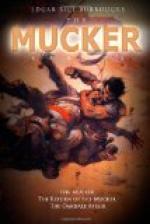CHAPTER VII
THE TYPHOON
The storm that struck the Halfmoon took her entirely unaware. It had sprung, apparently, out of a perfectly clear sky. Both the lookout and the man at the wheel were ready to take oath that they had scanned the horizon not a half-minute before Second Mate Theriere had come racing forward bellowing for all hands on deck and ordering a sailor below to report the menacing conditions to Captain Simms.
Before that officer reached the deck Theriere had the entire crew aloft taking in sail; but though they worked with the desperation of doomed men they were only partially successful in their efforts.
The sky and sea had assumed a sickly yellowish color, except for the mighty black cloud that raced toward them, low over the water. The low moaning sound that had followed the first appearance of the storm, gave place to a sullen roar, and then, of a sudden, the thing struck the Halfmoon, ripping her remaining canvas from her as if it had been wrought from tissue paper, and with the flying canvas, spars, and cordage went the mainmast, snapping ten feet above the deck, and crashing over the starboard bow with a noise and jar that rose above the bellowing of the typhoon.
Fully half the crew of the Halfmoon either went down with the falling rigging or were crushed by the crashing weight of the mast as it hurtled against the deck. Skipper Simms rushed back and forth screaming out curses that no one heeded, and orders that there was none to fill.
Theriere, on his own responsibility, looked to the hatches. Ward with a handful of men armed with axes attempted to chop away the wreckage, for the jagged butt of the fallen mast was dashing against the ship’s side with such vicious blows that it seemed but a matter of seconds ere it would stave a hole in her.
With the utmost difficulty a sea anchor was rigged and tumbled over the Halfmoon’s pitching bow into the angry sea, that was rising to more gigantic proportions with each succeeding minute. This frail makeshift which at best could but keep the vessel’s bow into the wind, saving her from instant engulfment in the sea’s trough, seemed to Theriere but a sorry means of prolonging the agony of suspense preceding the inevitable end. That nothing could save them was the second officer’s firm belief, nor was he alone in his conviction. Not only Simms and Ward, but every experienced sailor on the ship felt that the life of the Halfmoon was now but a matter of hours, possibly minutes, while those of lesser experience were equally positive that each succeeding wave must mark the termination of the lives of the vessel and her company.
The deck, washed now almost continuously by hurtling tons of storm-mad water, as one mountainous wave followed another the length of the ship, had become entirely impossible. With difficulty the men were attempting to get below between waves. All semblance of discipline had vanished. For the most part they were a pack of howling, cursing, terror-ridden beasts, fighting at the hatches with those who would have held them closed against the danger of each new assault of the sea.




